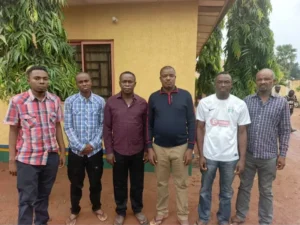Kidnapped Law Student Clarifies: “Our Captors Were Tiv, Not Fulani”
Kidnapped Law Student Clarifies: “Our Captors Were Tiv, Not Fulani”

David Obiora, a Nigerian Law School student recently freed from abduction, has revealed that he and others kidnapped on July 26, 2025, were held by Tiv locals from Benue State—not Fulani, as initially assumed by many.
In a detailed interview with Vanguard, Obiora, who studies at the Nigerian Law School campus in Yola, debunked the police narrative that security forces had rescued them. According to him, the group’s release came only after their families paid hefty ransoms.
Obiora and five other law students were traveling from Onitsha to Yola aboard a transport company vehicle when their journey was violently interrupted along the Zakibiam-Wukari highway. The group included additional passengers: three heading to Cameroon and a woman based in Anambra traveling to Yola for vacation.
“We were ambushed around 9 p.m. between Zakibiam and Wukari, close to a town called Jootar,” Obiora recounted. “Roughly ten armed men attacked us—four of them had AK-47s, the others carried machetes and knives. They forced us into the bush, nearly 20 kilometers in.”
The kidnappers, riding motorcycles, moved the captives deeper into the forest after the vehicle became stuck. There, they encountered four other hostages: a non-academic staff member of Federal University Wukari, a corps member named Dauda Wisdom, a pastor recovering from surgery, and another unidentified man.
Obiora said they were held for six days before being freed—not through any security intervention, but only after each of them paid ₦10 million as ransom.
“The police didn’t save us. Neither the Law School nor the Council of Legal Education had anything to do with our release,” Obiora emphasized. “It was our families and friends who raised the money.”
He further explained that the abductors spoke Tiv, and their leader—known as Matthew—was likely a former or deserter soldier. “They were clearly from the same local community where we were held. Everyone spoke Tiv, except maybe one or two who didn’t speak at all. The entire community seemed to be living in fear or complicit.”
Disturbingly, Obiora described seeing very young children in the camp, some playing with guns. “They treated it like normal life. Kids watched as their parents cooked for us and armed men cocked rifles beside them. The women prepared our food and fetched water—muddy water that we had no choice but to drink.”
One of the kidnappers, also named David, bragged about having been in the kidnapping business for nearly a decade. “He told us he hadn’t visited home in years because he’s wanted. Yet he said he bought a Highlander and another car for his wife. His kids are in school and well-fed, while he lives in hiding.”
Obiora also described conversations with the gang’s leader, Matthew, who claimed he had spiritual protection. “He boasted about a ‘juju’ man in Kano who makes him invincible to the military. He believed no one could kill him unless it was his destined day to die.”
Initially, Obiora admitted to thinking their attackers were Fulani, but that changed once he heard their dialect and observed their lifestyle. “When we arrived, I was terrified. It was my first kidnapping experience. But other victims who had been there for 22 days assured us the gang never kills, which gave me some relief.”
Despite that assurance, their living conditions were horrific. “We ate once a day. The food was poor, and we drank water no one would dare use to wash a car. Everything was handled by the women in their community.”
Upon their eventual release, the hostages were forced to walk for hours through the dense bush, crossing from Benue into Taraba. Exhausted and disoriented, they eventually stumbled upon a restaurant near a motor park where they spent the night. Later, they connected with a transport company manager who helped them get to Yola.
TRENDING SONGS
 NPMA Appeals to Nigerian Government for Compensation After Lagos Market Fire
NPMA Appeals to Nigerian Government for Compensation After Lagos Market Fire
 Rest Every Four Hours, FRSC Issues Safety Guide for Fasting Motorists
Rest Every Four Hours, FRSC Issues Safety Guide for Fasting Motorists
 NNPC Boss Ojulari Bags UK Energy Institute Fellowship
NNPC Boss Ojulari Bags UK Energy Institute Fellowship
 Shock in Anambra: Bride Disappears Moments Before Wedding
Shock in Anambra: Bride Disappears Moments Before Wedding
 Nigerian Woman Returns ₦330 Million Accidentally Credited to Her Account
Nigerian Woman Returns ₦330 Million Accidentally Credited to Her Account
 APC Don Reach Morocco?’ VeryDarkMan Reacts to Seyi Tinubu Poster
APC Don Reach Morocco?’ VeryDarkMan Reacts to Seyi Tinubu Poster
 Bride Breaks Down in Tears as Wedding Meals Were Kept Secretly While Guests Go Home Hungry
Bride Breaks Down in Tears as Wedding Meals Were Kept Secretly While Guests Go Home Hungry
 Odogwu by Day, Robber by Night: How Marriage Joy Turned Into Tragedy
Odogwu by Day, Robber by Night: How Marriage Joy Turned Into Tragedy
 Nigerian Officials Allegedly Pocket N4–6B Weekly Through Smuggling Cartels at Seme–Badagry Border
Nigerian Officials Allegedly Pocket N4–6B Weekly Through Smuggling Cartels at Seme–Badagry Border
 Ahmad Yerima: Naval Officer to Face No Sanctions After Clash with Wike – Matawalle
Ahmad Yerima: Naval Officer to Face No Sanctions After Clash with Wike – Matawalle
Share this post with your friends on ![]()













